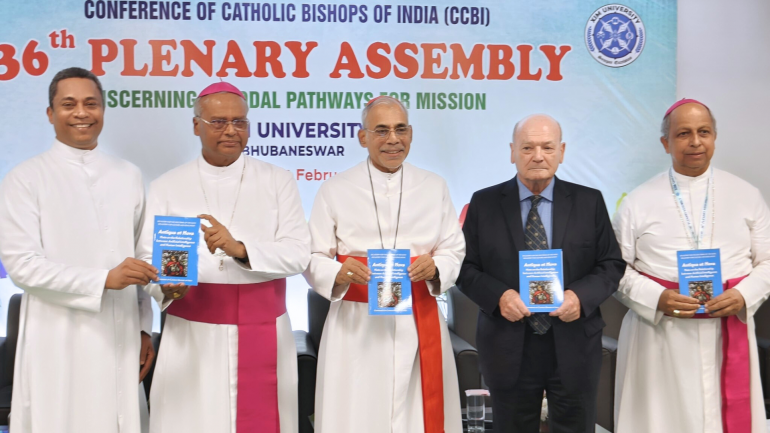CCBI Plenary Assembly ends with the release of Antiqua et Nova

The 36th Plenary Assembly of the Conference of Catholic Bishops of India (CCBI) on February 4 concluded with immense joy at XIM University in the Archdiocese of Cuttack-Bhubaneswar, Odisha, eastern India.
This landmark event witnessed the active participation of the laity, priests, and religious.
For the first time, the faithful suggested the discussion topics for the bishops, responding to the Preparatory Document, which guided the preparation of the Working Document.
The assembly decided to send a Letter of Gratitude to the People of God and to publish a Final Document, compiling the fruits of the Bishops' spiritual conversations during the Plenary. This document will align with the CCBI Pastoral Plan, the Synod Documents, and the Federation of Asian Bishops' Conferences (FABC) 50 Document, serving as a roadmap for the Church in India.
Cardinal Filipe Neri Ferro, re-elected as the CCBI President presided over a Thanksgiving Mass on a concluding day. Archbishop Peter Machado, the Vice President, and Archbishop Vincent Aind, Secretary General, concelebrated the Holy Mass.
The respective officials presented the financial accounts of the CCBI's seven legal bodies.
Additionally, the house approved the minutes of the 35th Plenary Assembly, presented by Archbishop Anil Couto, the former Secretary General.
During the valedictory function, Cardinal Ferrão honored the Bishops of Odisha, the local organizing committee, and the priests and staff of XIM University, recognizing their dedication to the success of the assembly.
A significant highlight of the Plenary was the release of the Indian edition of Antiqua et Nova (ancient and new), a document on the relationship between artificial intelligence and human intelligence, published by the Dicastery for the Doctrine of the Faith and the Dicastery for Culture and Education.
The members of the assembly proposed to organize the next Plenary Assembly of the CCBI at the Basilica of Our Lady of Good Health, Vailankanni, Tamil Nadu, south India. - Stephen Alathara
Radio Veritas Asia (RVA), a media platform of the Catholic Church, aims to share Christ. RVA started in 1969 as a continental Catholic radio station to serve Asian countries in their respective local language, thus earning the tag “the Voice of Asian Christianity.” Responding to the emerging context, RVA embraced media platforms to connect with the global Asian audience via its 21 language websites and various social media platforms.













